|
|
|
Sort Order |
|
|
|
Items / Page
|
|
|
|
|
|
|
| Srl | Item |
| 1 |
ID:
179812
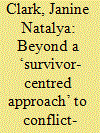

|
|
|
|
|
| Summary/Abstract |
In Resolution 2467 (2019), the most recent addition to the Women, Peace and Security (WPS) agenda, the UN Security Council embraced the idea of a ‘survivor-centred approach’ to preventing and responding to conflict-related sexual violence. While this terminology is now widely used in international policy circles, the general lack of critical reflection on the concept of survivor-centrism is striking. Addressing this gap, this interdisciplinary article seeks to demonstrate that a survivor-centred approach, by itself, is too narrow. It utilizes the ecological concept of connectivity—which refers to connections that enable and facilitate vital ecological processes—and repurposes it in a social science context to develop the article's core argument: that survivor-centred discourse marginalizes, or neglects, the fundamental webs of connectivity in which the everyday lives of those who have suffered conflict-related sexual violence are intricately interwoven. The article draws on qualitative interviews with victims/survivors of conflict-related sexual violence in Bosnia and Herzegovina, Colombia and Uganda to empirically develop two particular ‘connectivity critiques’ of survivor-centred discourse, focused on resources and health respectively. Ultimately, it is not advocating the abandonment of a survivor-centred approach, but, rather, a social-ecological reframing of it. It presents connectivity as a new conceptual approach for thinking about and dealing with conflict-related sexual violence.
|
|
|
|
|
|
|
|
|
|
|
|
|
|
|
|
| 2 |
ID:
093886
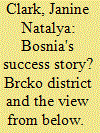

|
|
|
|
|
| Publication |
2010.
|
| Summary/Abstract |
Situated in the far northeastern corner of Bosnia and Herzegovina, Brcko District is widely heralded as a successful multi-ethnic society. Such portrayals are typically 'top down' and centred on institutions, yet it cannot be assumed that multi-ethnicity at the institutional level necessarily translates into everyday relations between Brcko's ethnic groups. Based on qualitative interview data, this article explores Brcko from the 'bottom up', through a focus on inter-ethnic relations in everyday life. Its central argument is that viewing Brcko through this additional lens not only raises important questions about the District's image as a success story but also, and more broadly, has significant implications in highlighting the limitations of liberal peacebuilding and the importance of 'peacebuilding from below'.
|
|
|
|
|
|
|
|
|
|
|
|
|
|
|
|
| 3 |
ID:
184137
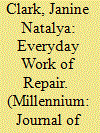

|
|
|
|
|
| Summary/Abstract |
This interdisciplinary article uses what Das has termed ‘the everyday work of repair’ as a framework for thinking about resilience. It is not the first to discuss resilience and the everyday. What is novel is the context in which it does so. Extant scholarship on conflict-related sexual violence has largely overlooked the concept of resilience. Addressing this gap, the article draws on semi-structured interviews with victims-/survivors of conflict-related sexual violence in Bosnia and Herzegovina (BiH), Colombia and Uganda to examine what everyday resilience ‘looks’ like and how it is expressed within and across highly diverse social ecologies. In so doing, it reflects on what everyday resilience means for transitional justice, through a particular focus on hybridity. It introduces the term ‘facilitative hybridity’, to underscore the need for transitional justice processes to give greater attention to the social ecologies that can crucially support and enable the everyday work of repair and everyday resilience.
|
|
|
|
|
|
|
|
|
|
|
|
|
|
|
|
| 4 |
ID:
129463
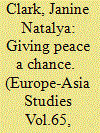

|
|
|
|
|
| Publication |
2013.
|
| Summary/Abstract |
This article focuses on ex-combatants (branitelji) in the town of Vukovar. It argues that while veterans currently present an obstacle to inter-ethnic reconciliation, this need not be the case; they can potentially play an important role as peace builders. As a first step, however, they need to be reintegrated into society, and to a large extent this has not yet happened. The purpose of this article is thus to reflect on possible ways of advancing the reintegration process, focusing on the core themes of identity and trauma.
|
|
|
|
|
|
|
|
|
|
|
|
|
|
|
|
| 5 |
ID:
096244
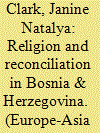

|
|
|
|
|
| Publication |
2010.
|
| Summary/Abstract |
The article explores the question of whether and how religion is being used in Bosnia & Herzegovina (BiH) to promote and foster reconciliation. Based primarily on 20 semi-structured interviews with representatives of the three main faiths in BiH-Islam, Orthodoxy and Catholicism-the article's central contention is that religion is a potentially valuable, yet fundamentally under-utilised peace-building tool in BiH.
|
|
|
|
|
|
|
|
|
|
|
|
|
|
|
|
|
|
|
|
|